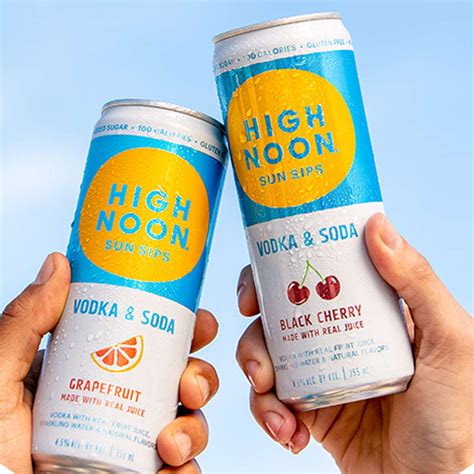Introduction
In recent years, the demand for healthy and convenient alcoholic beverages has surged. Low-calorie canned alcohol has emerged as a popular solution, providing consumers with a way to enjoy their favorite drinks without sacrificing their health goals. This comprehensive article delves into the world of low-calorie canned alcohol, exploring its key benefits, potential drawbacks, and market growth.

The Rise of Low-Calorie Canned Alcohol
The popularity of low-calorie canned alcohol has soared in recent years, fueled by a growing health consciousness among consumers. According to the Beverage Marketing Corporation, the market for low-calorie canned alcohol is projected to reach $5.5 billion by 2026, with a compound annual growth rate (CAGR) of 12.3%.
Health Benefits
Low-calorie canned alcohol offers several health benefits compared to traditional alcoholic beverages.
Reduced Calorie Intake
The primary benefit of low-calorie canned alcohol is its significantly lower calorie count. Traditional alcoholic drinks, such as beer, wine, and cocktails, typically contain a large number of calories from sugar and carbohydrates. Low-calorie canned alcohol, on the other hand, contains fewer calories per serving, making it a healthier choice for calorie-conscious individuals.
Lower Alcohol Content
Low-calorie canned alcohol also has a lower alcohol content than traditional alcoholic beverages. This can be beneficial for those who wish to limit their alcohol consumption without compromising on taste and enjoyment. The lower alcohol content also reduces the risk of alcohol-related health problems, such as liver damage and cardiovascular disease.
Hydration
Low-calorie canned alcohol is often formulated with electrolytes, such as sodium and potassium. These electrolytes help to replenish fluids and prevent dehydration, which can be a common side effect of alcohol consumption.
Motivation Factors
Several factors are driving the growing popularity of low-calorie canned alcohol:
Increasing Health Awareness
Consumers are becoming increasingly aware of the health risks associated with excessive alcohol consumption. Low-calorie canned alcohol provides a healthier alternative that allows individuals to indulge in their favorite beverages without compromising their well-being.
Convenience
Low-calorie canned alcohol is highly convenient. It is available in a wide variety of flavors and styles, offering consumers a diverse selection to choose from. The ready-to-drink format also eliminates the need for preparation or mixing, making it a hassle-free option.
Socialization
Alcohol has long been associated with socialization. Low-calorie canned alcohol allows individuals to enjoy alcoholic beverages in social settings without feeling guilty or compromising their health goals.
Common Mistakes to Avoid
When consuming low-calorie canned alcohol, it is important to avoid certain common mistakes:
Exceeding Recommended Intake
Although low-calorie canned alcohol is healthier than traditional alcoholic beverages, it is still important to consume it in moderation. The recommended daily intake of alcohol for women is one drink per day, and for men, it is two drinks per day.
Mixing with Sugary Beverages
Mixing low-calorie canned alcohol with sugary beverages, such as soda or juice, can negate the health benefits. These beverages add empty calories and increase the risk of weight gain.
Consuming Empty Calories
Some low-calorie canned alcohol products may contain artificial sweeteners or other sugar substitutes. While these products are lower in calories, they may not be as satisfying and can lead to increased cravings for sugary foods.
Why Low-Calorie Canned Alcohol Matters
Low-calorie canned alcohol is an important beverage option for health-conscious consumers. It offers a healthier alternative to traditional alcoholic beverages, providing numerous health benefits, convenience, and socialization opportunities.
Benefits of Low-Calorie Canned Alcohol
Consuming low-calorie canned alcohol offers several key benefits:
Weight Management
Low-calorie canned alcohol can help support weight management goals by reducing calorie intake. By choosing low-calorie options, individuals can enjoy their favorite beverages without sacrificing their progress.
Reduced Health Risks
Lower alcohol content and calorie intake can reduce the risk of various health problems, including liver damage, cardiovascular disease, and certain types of cancer.
Enhanced Hydration
Electrolytes in low-calorie canned alcohol help replenish fluids, preventing dehydration and its associated symptoms, such as headaches and fatigue.
Table 1: Comparison of Calorie Content in Alcoholic Beverages
| Beverage Type | Calories per 12-Ounce Serving |
|---|---|
| Regular Beer | 150-200 |
| Light Beer | 100-120 |
| Wine (5% ABV) | 120-130 |
| Low-Calorie Canned Alcohol (4.5% ABV) | 80-100 |
Table 2: Benefits of Low-Calorie Canned Alcohol
| Benefit | Description |
|---|---|
| Reduced Calorie Intake | Significantly lower calorie count compared to traditional alcoholic beverages |
| Lower Alcohol Content | Helps limit alcohol consumption without compromising taste |
| Hydration | Replenishes fluids and prevents dehydration |
| Weight Management | Supports weight management goals by reducing calorie intake |
| Reduced Health Risks | Lower alcohol content and calorie intake reduce the risk of health problems, such as liver damage and cardiovascular disease |
Table 3: Potential Drawbacks of Low-Calorie Canned Alcohol
| Drawback | Description |
|---|---|
| Higher Cost | Low-calorie canned alcohol can be more expensive than traditional alcoholic beverages |
| Limited Flavor Options | The selection of low-calorie canned alcohol flavors may be narrower compared to traditional alcoholic beverages |
| Artificial Ingredients | Some low-calorie canned alcohol products may contain artificial sweeteners or other sugar substitutes, which may not be as satisfying and could lead to increased cravings |
Table 4: Motivations for Consuming Low-Calorie Canned Alcohol
| Motivation | Description |
|---|---|
| Health Consciousness | Desire to consume healthier alcoholic beverages |
| Convenience | Ready-to-drink format eliminates the need for preparation or mixing |
| Socialization | Allows enjoyment of alcoholic beverages in social settings without feeling guilty or compromising health goals |
| Calorie Management | Support for weight management |
